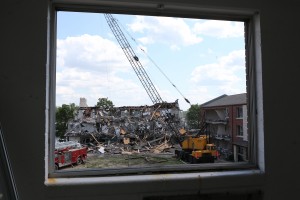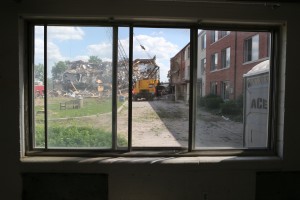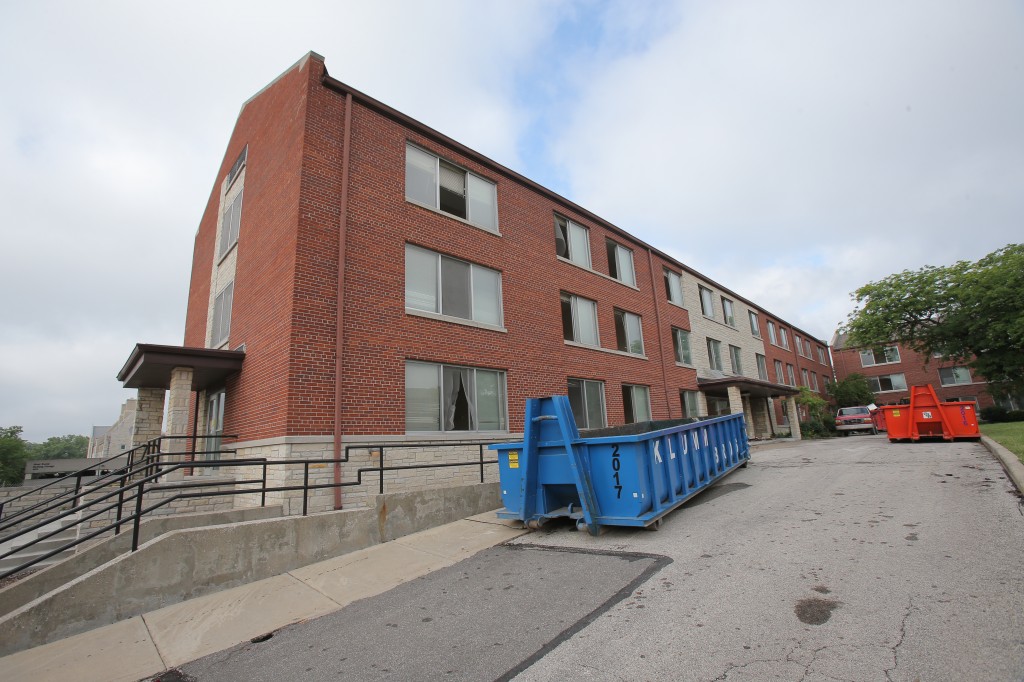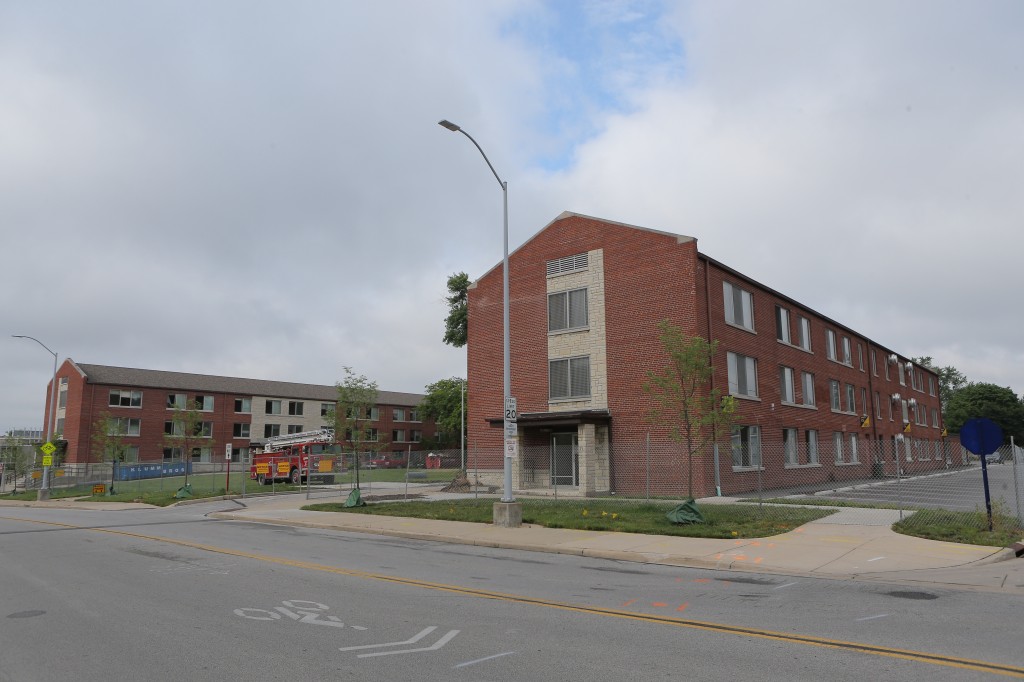Gone But Not Forgotten
Dowd-Nash-White Dorms Live on in Memories
By Barbara Floyd
A drive through The University of Toledo campus today reveals a far different landscape than just a few months ago. The Dowd-Nash-White dormitories that had occupied the northwest corner of the campus since 1953 are gone, with barely a trace to mark where they once stood.
But guessing from the response from an article about the dorms that appeared in the July issue of Toledo Alumni Magazine, they may be gone, but they are not forgotten. Many people responded with comments and photographs of their times living in the dorms and recalled how these buildings shaped their college experience.
Rick Rump (A/S ‘72) remembered a lounge that was located where Dowd and Nash halls intersected. The lounge was a gathering place for students in the Honors Program, and was accessible to those students 24 hours a day. Dr. Ernest Gray, who headed Honors at the time, had an office there. Rump said, “I spent a lot more time in that lounge than I ever did in my room.”
David Chervin (BUS ‘72) lived in White Hall his freshman and sophomore years at UT. The Georgia resident made many friends with the other students, and still keeps in touch with some of them. While he was from Cleveland, many of the other residents were from New York and New Jersey, and Chervin said this led to some cultural clashes at first. But he added that all of the residents grew close.
 Most of the 1,100 students living on campus at the time were without cars, which meant that it was important to make friends outside the dormitories so that they would have access to someone with a car in order to explore the city. But, he added, there were many drinking establishments within walking distance, so a car was not essential for this recreational activity.
Most of the 1,100 students living on campus at the time were without cars, which meant that it was important to make friends outside the dormitories so that they would have access to someone with a car in order to explore the city. But, he added, there were many drinking establishments within walking distance, so a car was not essential for this recreational activity.
Chervin also remembered that the dormitories had strict curfew rules, and residents had to sign in and out. The freshmen women who lived in the dorms had to be in their rooms by 10:30 on weekdays, and 2 a.m. on weekends. Upper class women could stay out until midnight during the week.
As for activities by those living in the dorms, Chervin said they loved to hang out on the grassy area between the dorms, and they organized several active intramural sports teams. He also recalled, “We had a bunch of guys we nicknamed the ‘Night Crew.’” They would watch old reruns of “Sea Hunt” and “Highway Patrol” all night, and missed most of their classes because they slept all day.” Chervin also remembered that living in these dorms was a good deal financially speaking, with the cost of room and board at only $330 a quarter, which included 21 meals a week.
 John A. Cooke (ENG ‘99) had especially fond memories of the dormitories, since they were where he met his future wife, Sarah Suh (A/S ‘98). He lived in Dowd, while she lived in MacKinnon. “Were it not for Dowd, our son Anderson might not exist,” Cooke said. And like David Chervin, Cooke said he still keeps in touch 20 years later with many of his fellow residents.
John A. Cooke (ENG ‘99) had especially fond memories of the dormitories, since they were where he met his future wife, Sarah Suh (A/S ‘98). He lived in Dowd, while she lived in MacKinnon. “Were it not for Dowd, our son Anderson might not exist,” Cooke said. And like David Chervin, Cooke said he still keeps in touch 20 years later with many of his fellow residents.
“Dowd Hall was a special place for me and my wife,” Cooke recalled. “We cherish all of the special memories and friends made possible by what seemed like a magical place. The community style of living, open green space and volleyball courts encouraged people to build lasting bonds, while maintaining an individual identity.”
George Palovich (ED ‘60) not only lived in the dorms, but he was also a resident manager. In 1958, he helped create a “dorm handbook” titled “Accentuate the Positive in the Men’s Residence Halls.” As an art major, he illustrated the handbook.
Among the advice included in the handbook:
- “Courtesy and thoughtfulness in the cafeteria are marks of good breeding.”
- “There will be a room inspection by the proctor or a manager at least one a week. Any grade below 8 is unacceptable.”
- “The management feels an obligation to provide an atmosphere in the residence halls which is conducive to good study and restful sleep.”
- “Disorderly conduct in or around the residence halls by those under the influence of alcohol is not the mark of a gentleman and will not be tolerated. If you must get drunk, come home and go to bed and don’t advertise your weakness to the campus community.”
- “Gambling, in any form, for material gain, will not be tolerated in any section of the residence halls. This is a bad habit and most of you cannot afford to lose—and someone always does.”
One theme runs through all of the comments received about the demolition of these buildings: for all of their faults, they were the best place to live. David Chervin said his freshman and sophomore years in White Hall were some of the best of his life. John and Sara Cooke agree: “Many times we reminisce about how much fun and how much growth we experienced in a short time there.”
“Thank you Dowd-Nash-White (and MacKinnon) and thank you to UT for a magnificent experience!” they added.









